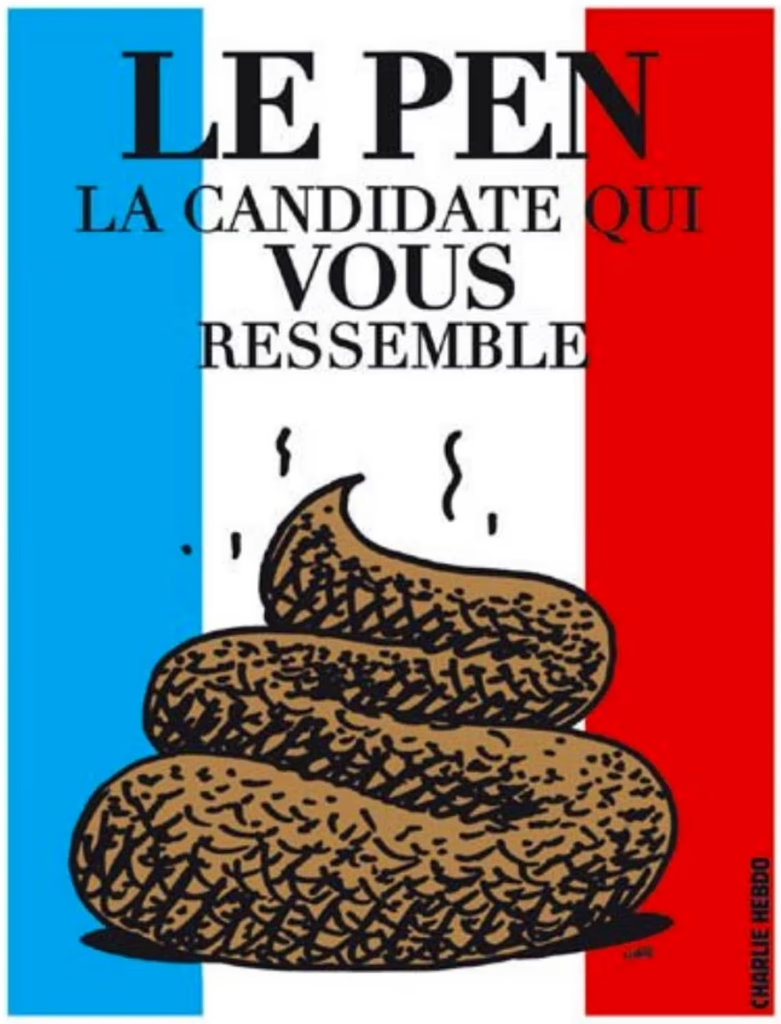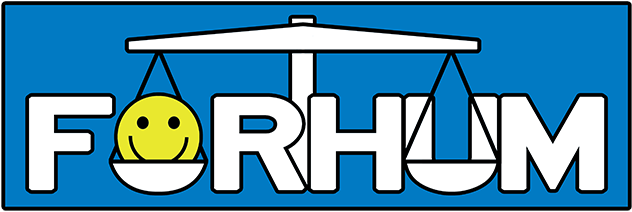
Mode of expression: Press cartoon and TV
Publication: Charlie Hebdo / TV show in France 2: On n’est pas couché
Region: Europe (France)
Relevant dates: 4 and 7 January 2012 (publication); 25 October 2019 (final decision)
Outcome: Acquittal
Judicial body: Court of Cassation
Type of law: Civil Law
Themes: Dignitary harm / Reputation / Scatology
Context
During the 2012 presidential campaign in France, the TV show On n’est pas couché, broadcast on France 2, presented several parody posters attributed to the candidates, which had been published in the satirical magazine Charlie Hebdo. One of these posters depicted steaming excrement with the text “Le Pen, the candidate who resembles you.”
Legal case
The candidate from the National Front, Marine Le Pen, filed a complaint against the show’s presenter, Laurent Ruquier, for “complicity in public insults against an individual,” thus targeting a larger media outlet with a greater audience than Charlie Hebdo, which had originally published the cartoon.
The criminal court acquitted Ruquier and rejected the claim for damages made by the plaintiffs. The case went through different legal instances at the Paris Court of Appeal and the Criminal Chamber with opposing outcomes. In 2019, after seven years, the Court of Cassation ruled that, “even though the insult is characterised in all its constituent elements,” the limits of freedom of expression had not been exceeded. The court also added that the satirical poster had been shown “along with other posters parodying each of the presidential candidates in the sequence of a controversial program resembling a press review, with express mention that these posters come from a satirical newspaper and themselves have a polemical character.”
The Court of Cassation sought a “just balance” between the right to private life and the right to freedom of expression. The court dismissed the notion of “dignity of the human person,” which had been advanced by the Criminal Chamber in 2016, arguing that it “can not be established as an independent basis for restrictions on freedom of expression.” The lone exception, the court reasoned, would be messages that are racist, xenophobic, anti-semitic or segregationist. In its ruling, the court also claimed that the limits of freedom of expression are broader when it comes to satire and politicians and that condemning Ruquier would constitute a “disproportionate infringement” of this freedom.
Analysis
Like the other cases addressed in this section, this “steaming excrement” incident received massive attention in the media and among the public in France as it intensively tested the freedom of expression and its limits. Unlike, for instance, the Muhammad cartoons, which were ambiguous and polysemous, the cartoon targeting Le Pen (and her partisans) did not lend itself to multiple interpretations. This lack of ambiguity was reinforced by the scatological nature of the image, as such representations tend to trigger a general effect of disgust among the audience.
This cartoon serves as a good example of the potential of visual-verbal interaction to convey meaning and create a humorous effect. Only three conventional visual elements are present in the cartoon: a depiction of excrement; the graphic representation of smell by means of squiggly vertical lines; and the French flag, a national and thus traditional symbol. As a result, the only way to connect the faeces to the political candidate is through the text: “Le Pen, the candidate who resembles you.” This domain of conventionality clashes, however, with the incongruous association between the steaming excrement and the national symbol. Desacralisation and – in a broader sense – the art of subverting hierarchies, powerful groups and their symbols, are characteristic features of humour and satire. They are also, undoubtedly, a constituent trait of Charlie Hebdo’s style.
A second incongruity lies in the contradiction between the faeces and the words. While the former belongs to the domain of scatology, the slogan and the flag refer to the domain of political campaign posters. Incongruities and desacralisation establish a parodic approach to the campaign together with a clear negativity towards the candidate Le Pen. The rejection is, more precisely, not only of the far-right political leader but also of her voters. This is emphasised by the bold letters used in Le Pen and vous (you). The author of this cartoon, Charb, resorted to a widespread metaphor that associates human waste with a negative appraisal. The structure and content of the verbal phrase imitates the slogan type, interpellating far-right voters. In this way, a typical form of political slogan, aimed to produce an intimacy between the candidate and the electorate, is twisted and used against them.
Sources and further reading:
Delrieux, Emmanuel. (2019-2020). “Libre polémique politique. Injure, atteinte à la dignité et humour”. La revue européenne des médias et du numérique, 53. DOI: https://la-rem.eu/2020/04/libre-polemique-politique-injure-atteinte-a-la-dignite-et-humour/
Perot, June. (2019). “Dessin humoristique et limites de la liberté d’expression : l’Assemblée plénière de la Cour de cassation rejette le pourvoi d’une personnalité politique”. Lexbase, 17. DOI: https://www.lexbase.fr/revues-juridiques/54478285-breves-dessin-humoristique-et-limites-de-la-liberte-d-expression-l-assemblee-pleniere-de-la-cour-de
